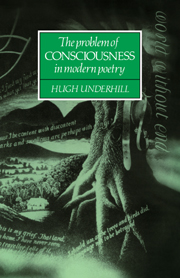Book contents
- Frontmatter
- Contents
- Preface
- Introduction: the inward revolution
- 1 From Georgian origins to ‘Romantic primitivism’: D. H. Lawrence and Robert Graves
- 2 Strangers to nature: modern nature poetry and the rural myth
- 3 The ‘poetical character’ of Edward Thomas
- 4 ‘Myself must I remake’: W. B. Yeats
- 5 ‘Here and now cease to matter’: T. S. Eliot
- 6 The work of Man: Louis MacNeice and W. H. Auden
- 7 ‘Nothing of our light’: Ted Hughes
- Conclusion
- Notes
- Select bibliography
- Index
3 - The ‘poetical character’ of Edward Thomas
Published online by Cambridge University Press: 18 December 2009
- Frontmatter
- Contents
- Preface
- Introduction: the inward revolution
- 1 From Georgian origins to ‘Romantic primitivism’: D. H. Lawrence and Robert Graves
- 2 Strangers to nature: modern nature poetry and the rural myth
- 3 The ‘poetical character’ of Edward Thomas
- 4 ‘Myself must I remake’: W. B. Yeats
- 5 ‘Here and now cease to matter’: T. S. Eliot
- 6 The work of Man: Louis MacNeice and W. H. Auden
- 7 ‘Nothing of our light’: Ted Hughes
- Conclusion
- Notes
- Select bibliography
- Index
Summary
Edward Thomas's poetry is made out of a haunted and restless temper compounded by a life that gave him no rest. R. George Thomas commented:
The sheer amount of Thomas's reviews is forbidding … At a conservative estimate I think that these preserved [i.e. by Thomas himself] reviews represent about two-thirds of Thomas's total output … a minimum of 1,122 reviews – just over a million words about 1,200 books. During the first four years [i.e. 1900–4] he averaged 80 reviews a year … between the Chrstmasses of 1905 and 1912 he was contributing 100 signed (or full-length) reviews annually to the Daily Chronicle or the Daily Post … to The Nation, The Athenaeum, or The English Review, besides at least 50 shorter notices to weeklies and, after 1907, a monthly article or two-column unsigned review to The Bookman.
Financial harassment and sheer fatigue intensified his innate darkness of temper. Weariness is a recurring theme; in The Icknield Way he writes: ‘There will never be any summer any more, and I am weary of everything. I stay because I am too weak to go, I crawl on because it is easier than to stop.’ Relations with his family were often strained, and, too inwardly troubled to settle to a permanent job, he travelled ceaselessly about the countryside of England and Wales, in what was really an inner quest, for the rest and fulfilment he could never find.
- Type
- Chapter
- Information
- The Problem of Consciousness in Modern Poetry , pp. 89 - 121Publisher: Cambridge University PressPrint publication year: 1992



